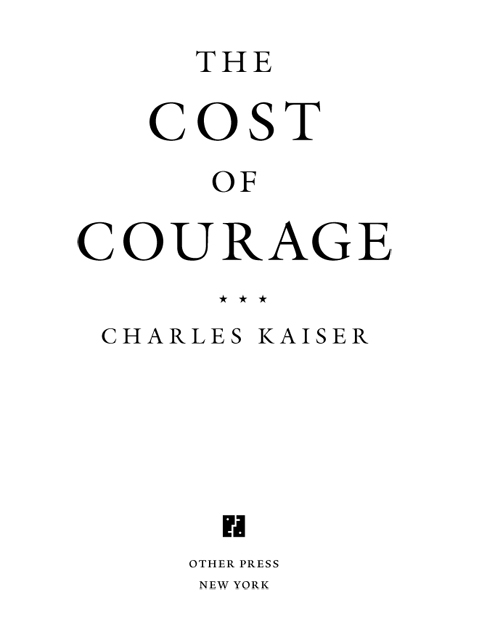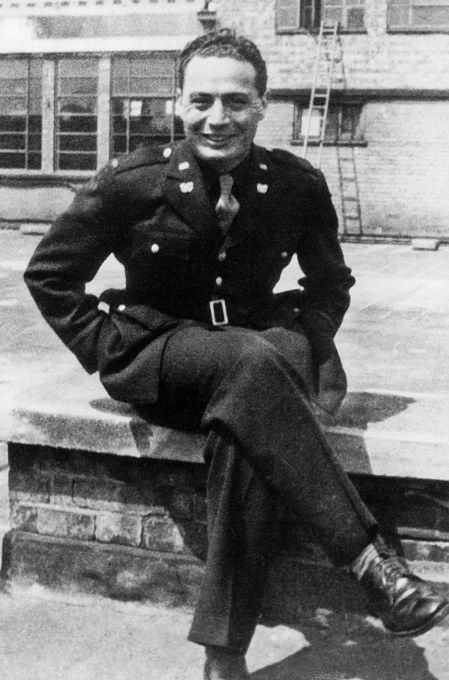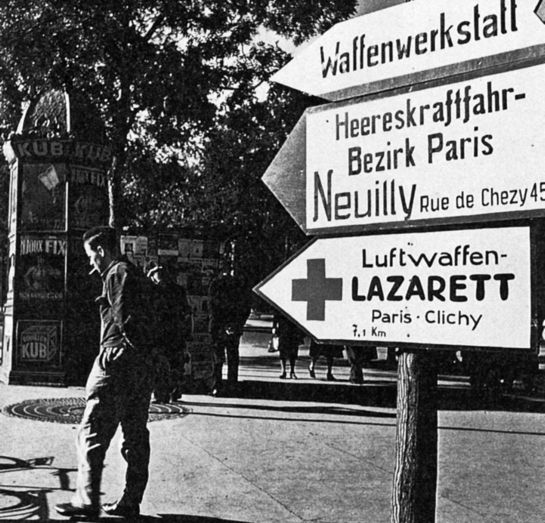The Cost of Courage
Read The Cost of Courage Online
Authors: Charles Kaiser

ALSO BY CHARLES KAISER
1968 in America: Music, Politics, Chaos, Counterculture, and the Shaping of a Generation
The Gay Metropolis: The Landmark History of Gay Life in America

Copyright © 2015 by Charles Kaiser
Production editor: Yvonne E. Cárdenas
Text designer: Julie Fry
All rights reserved. No part of this publication may be reproduced or transmitted in any form or by any means, electronic or mechanical, including photocopying, recording, or by any information storage and retrieval system, without written permission from Other Press LLC, except in the case of brief quotations in reviews for inclusion in a magazine, newspaper, or broadcast. For information write to Other Press LLC, 2 Park Avenue, 24th Floor, New York, NY 10016.
Or visit our Web site:
www.otherpress.com
The Library of Congress Cataloging-in-Publication Data
was unavailable at the time of this book’s printing.
Hardcover
ISBN
978-1-59051-614-0
E-book
ISBN
978-1-59051-615-7
v3.1
For Joe
&
For Christiane
naturellement
If mankind lasts because of the masses of people for whom enduring has a higher value than acting, its fate is determined by those who choose, act, and decide.
— Stanley Hoffmann, paraphrasing Paul Valéry
This is such a story of coincidences — or luck, or destiny.
— Eric Katlama
Prologue
THE FIRST TIME I SAW PARIS
,
I FELL IN LOVE
.
It was 1962, and I was eleven years old.
Her name was Christiane Boulloche-Audibert.
She was a beguiling thirty-eight-year-old brunette, the mother of four children, a campaigner for women’s rights, and a hero of the French Resistance. She was strong and warm, percolating with life and love, and ten years younger than my own mother.
Her husband was Jean Audibert, a brilliant, high-spirited engineer with a belly-shaking laugh, a passion for fast cars, and a gigantic joie de vivre.
Jean had fought in the Free French Navy, and he witnessed the Normandy invasion from the sea—a good war, but not nearly as fraught as Christiane’s. Their sons and daughters, each just a little bit older or younger than I was, were smart, political, precocious, and bilingual, which made them very much like everyone in my family.
I was the third of three sons. My father had just become a diplomat, and we were living in Dakar, in West Africa, where John F. Kennedy had made him his ambassador.
As a child, I was obsessed with the black-and-white images of World War II. To a young American who hadn’t lived it, the war glowed with the romance of victorious history. When I met Christiane, the war was seventeen years behind her—an expanse that felt like a lifetime and a half to an eleven-year-old.

My uncle, Henry Kaiser, who moved in with Christiane and Jaqueline Boulloche at the end of 1944, when he was an American lieutenant stationed in Paris. He quickly learned everything that had happened to them while they were in the Resistance.(
photo credit 1.1
)
It did not occur to me that for Christiane, it felt more like the day before yesterday. And, as she admonished me twenty years later, to her it had never been romantic
at all.
In the fall of 1944, just after the Liberation of Paris and the triumphant return of Charles de Gaulle, Christiane and her sister, Jacqueline, saw an ad in the newspaper seeking housing for U.S. Army officers. That ad created a bond that continues after seven decades.
My uncle, Henry Kaiser, was the lieutenant they took in, rent free, “in gratitude to the Allies,” as Christiane always explained it. They installed him in an empty bedroom in their parents’ sprawling apartment in the 16th arrondissement.
The most dramatic movie about the war was one I learned by heart but had seen only in my head. All of its images came from my uncle Henry, a charismatic storyteller with animated eyebrows and magnetic good looks. In an implausibly deep, tobacco-tinged baritone, he re-created the movie’s layers of suspense for me, over and over again.
The film starred Christiane, Jacqueline, and their brother André, and its plot was exhilarating.
During the twelve months my uncle Henry lived in their apartment, he learned about almost everything the two sisters had endured during the four years the Nazis occupied Paris. There had been many narrow escapes. I reveled in their brave adventures and their incredible grace under pressure.
Years later, as the red wine flowed freely around the dining room table at their apartment in square Alboni in Paris, or the picnic table at their country house in Fontainebleau, where Christiane and Jean were joined almost every weekend by Christiane’s extended family, Kaisers and Audiberts and Boulloches dissected everything from de Gaulle and Kennedy to
Jules and Jim.
But I don’t remember anyone telling the stories I had heard from my uncle about the war. I may have assumed that it was not discussed because the grown-ups had already talked about it so often. But
there was also the number tattooed on André’s forearm—the first one I had ever seen—and André’s grim demeanor, hinting at unvanquished demons.
Nevertheless, for a very long time, I did not realize that World War II was a taboo subject within Christiane’s family. The ones who had been so magnificent in the Resistance never discussed their bravery with their own children.
They actually avoided anything that might remind them of those piercing years. Christiane had had many close friends in the Resistance, but after the war ended, she never saw any of them again. She blotted out that part of her life, as much as she could, after she and her sister decided that “it was necessary to turn the page.”
I grew up inspired by the story of my remarkable French cousins, whom I thought of as a branch of my own extended family. Christiane was like a beacon. Her life proved that you could do the right thing, the most difficult thing, if you were determined to do it. Perhaps one wouldn’t, but one always could—even under the most chilling circumstances.
But their own children were never really nourished by their parents’ bravery. They admired it, they appreciated it, they were intimidated by it — but it never felt nurturing.
What they experienced most of the time was an amorphous black cloud, never fully visible, hovering somewhere above their parents’ past.
It would take me five decades, including two and a half years living in France, to unravel the reasons for the heroes’ silence.
The answer is
The Cost of Courage.
PARIS
—
JANUARY
12, 1944
I
T IS
a few minutes before four on a gray Paris afternoon when the black Citroën Traction Avant pulls up in front of a drab apartment building in the rue de la Santé on the Left Bank. The low-slung, front-wheel-drive Citroën is famous as the getaway car for French gangsters, but now it has acquired a more menacing pedigree: It is the official automobile of the German secret police.
Two Gestapo agents in black leather raincoats jump out onto the sidewalk. They pull a single prisoner, a short twenty-year-old Frenchman named Jacques, out of the car after them. The youth’s nearly limp body broadcasts defeat, but he shows no obvious marks of a beating.
Two and a half miles away, a swastika sways in the wind atop the Eiffel Tower. It is the one thousand three hundred and eighth day of the Nazi Occupation of Paris. Dozens of other swastikas defile the French capital. Below them, street signs written in German punctuate the avenues with unfamiliar accents, humiliating Parisians at every carrefour.
The city’s best restaurants, like Maxim’s and La Tour d’Argent, are still flourishing, but now their customers are mostly German officers and their young French companions.

German street signs punctuate Paris avenues with unfamiliar accents, humiliating the French at every carrefour.(
photo credit 1.2
)
Starvation rations for the French have transformed apartment terraces into rabbit farms, as the urban dawn is oddly heralded by roosters. More fortunate Parisians rely upon the generosity of country cousins, who have much more access to food.
Daytime Paris echoes to the sound of shoes with wooden soles clip-clopping down its narrow side streets and grand avenues. “If an old pair of shoes needs a new sole, you can’t do anything about it, because there is no leather,” said Pierre Mendès-France. “It’s really very difficult to describe what life is like in a country where everyone spends all their time looking for things.”
The nightly blackout means the only authorized light outdoors is the eternal flame under the Arc de Triomphe. Electricity and gas are both erratic. Heated apartments are a dimly remembered luxury from 1940. Only seven thousand cars circulate on the streets of the City of Light — many of them converted to run on wood. They are called
gazogènes.
Two million bicycles are the best way to get around aboveground. But a good bicycle can cost 10,000 francs — almost as much as a car did before the war. The only taxis are pedicabs pedaled by bicycle riders, or “taxis hippomobiles,” pulled by a single horse. The fastest pedicab is propelled by veterans of the Tour de France.
Bicycle power also keeps the movie theaters open: four men pedaling a generator at thirteen miles an hour for six hours can produce enough reliable electricity for two full shows.